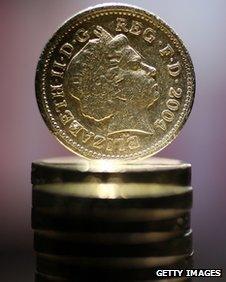More than 70% of high earners paid 50% tax rate
- Published
- comments

When Labour was in power, it was a nightmare trying to obtain reliable data on the real tax burden for those on very high incomes (there's a big chunk of the last book wot I wrote about whether the super-rich pay their fair share: the word "blood" and "stone" come to mind).
So I was fascinated and somewhat amused that a coalition government of Tories and Lib Dems is volunteering this information.
Here's the punchline in the comedy of politics.
Labour had persuaded itself that the super-rich were making a big indirect contribution to the health of the British economy by employing lots of people at their hedge funds, private equity firms and similar new-generation financial businesses - which many would see as the antithesis of what Labour would normally believe.
So a Labour-controlled Treasury was not desperately keen to shout about how these phenomenally well-heeled people exploited tax loopholes to massively cut the rate of tax they pay on their income: in many cases their tax rates were below what those on low and middling incomes typically pay.
Meanwhile a Tory Chancellor, George Osborne, is convinced that those on the highest incomes are not making a proper contribution to the reduction of the government's excessive deficit - and so he wants to limit their ability to avoid tax, including through his controversial plan to limit how much they can cut their tax bill by making big contributions to charity.
So a government led by Conservatives, normally regarded as the pals of the rich, is conducting a campaign to highlight how many high earners are refusing to participate in the supposedly collective fight to restore the public finances and the health of the economy.
Here is what the Treasury says in its statement today: "People earning £20,000 pay a higher rate of tax than some people earning millions...The Government is shining a light on the way the current tax rules work and demonstrating a clear commitment to creating a fairer system".
Crikey, ain't politics weird?
What do the Treasury's stats show?
Well, of the 10,000 people who in 2010/11 declared an income in the range £1m to £5m, around 1,000 of these paid a tax rate of less than 30%, well below the top rate of 50%, including 200 people paying a tax rate of between 10% and 20% and 300 people paying less than 10%. That is a lot of tax lost to the Exchequer.
For those earning between £5m and £10m, 44 people paid less than 30% - including 16 people on these massive incomes paying a tax rate below 10%.
And of the 200 people earning more than £10m a year, 16 paid between 20% and 30%, six paid between 10% and 20%, and 12 high earners paid a tax rate below 10%.
So if we take a notional example of individuals declaring income of £15m in 2010/11, if they succeeded in reducing their income-tax rate to less than 10% by using tax-avoidance measures - including, for example, by making substantial contributions to charity - that would have resulted in a £6m reduction in receipts for the Treasury for each one of them.
You can see why in our straitened times, Mr Osborne would quite like to have that £6m.
But here is the funny thing about the data disclosed today by the Treasury. As you know, George Osborne is scrapping the 50% top rate of tax, and replacing it with a 45% rate, because he was informed by Her Majesty's Revenue and Customs that there was massive avoidance of the new top rate, such that the yield from the higher rate was trivial.
However today's data shows that more than 73% of those earning over £250,000 were paying an average tax rate above 40% in 2010/11. And even among those earning between £5m and £10m and those earning over £10m, the proportion paying more than 40% in tax was 81% and 72% respectively.
All of which implies that many tens of thousands of people were (and are) paying the 50% tax rate, and were unable to dodge it. To state the bloomin' obvious, all of those people were given a very lovely tax cut in the budget - which will doubtless add fuel to Labour's campaign that the budget rewarded the rich at the expense of the rest.
Now it is possible, I suppose, that vast numbers of people artificially reduced their income below the threshold of £150,000 (by deferring dividends for example) to avoid the 50% rate. That is certainly the implication of HMRC's study of what was happening.
But even so it is striking quite how many people paid tax greater than 40% - a proportion 10 times greater than those who succeeded in paying almost no tax. Or to put it another way, perhaps the highest earners have had a slightly unfair press, because the majority of them seem to have been paying their proper share.